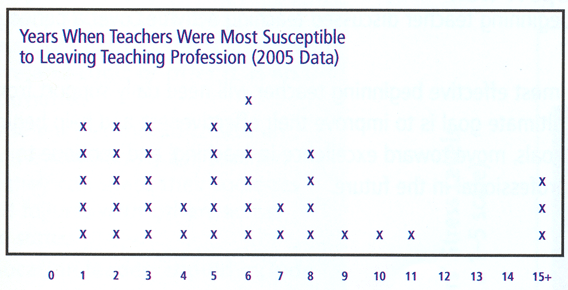Research
Summary
This
study utilized data collected from a sample survey
distributed across three counties in Delaware, determining
if there were particular time frames when teachers
were most likely to consider leaving the educational
profession.
It also
attempted to determine patterns of teacher reasoning
and behaviors that may contribute to retention problems.
Eighty-four teachers with one to fifteen years of
classroom experience were asked various questions
concerning experiences in the “trenches” of their
own classrooms.
While
55% of teachers were found to be content with their
teaching experience, as many as 45% of the eighty-four
teachers surveyed admitted to a period of time when
they contemplated leaving their profession.
It was
discovered that the majority of the teachers who
contemplated movement had been in their careers
from three to five years. With the national teacher
retention rate only as high as 50% within the first
five years, this was no surprise. Interestingly
enough, however, the pattern continued and spiked
at six years, with a gradual decline at eight years.
Another spike repeated at fifteen years.

What are the reasons behind these teachers’ departures?
Before distributing the survey, I surmised that
pay would be one of the most important reasons for
leaving. However, this was not the case. When individual
teachers were asked the reasons why they were experiencing
job dissatisfaction, there were surprising similarities
in answers.
First
was lack of parental interaction, interest, and
support, with student behavior problems following
in second place. With a clearer definition of the
trend of teacher departures, it would be beneficial
for state educational agencies and districts across
Delaware to find a way to support this vulnerable
group and to keep highly qualified teachers where
they belong: in the classroom.
RECOMMENDATIONS
- Further
explore the reasons why teachers leave their profession.
- Provide
workshops to help new teachers work with students
and parents effectively.
- Implement
properly run mentoring programs to benefit new
teachers.
- Create
support groups within school buildings for both
new and experienced teachers to share ideas and
gain strength to meet everyday challenges.
|